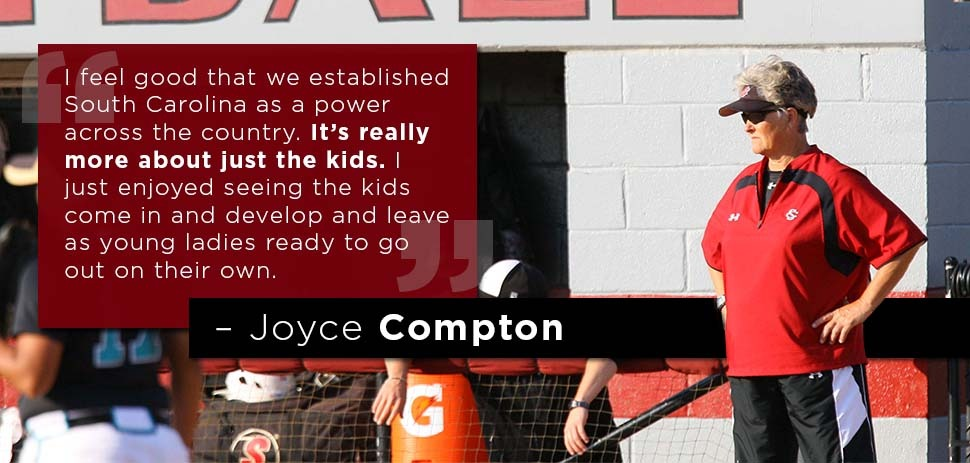
Compton Enjoying Life After Hall of Fame Career
May 12, 2015

After 35 years as a head softball coach, including 24 at South Carolina during her Hall of Fame career, Joyce Compton still loves the game, but she doesn’t miss being in the dugout.
“I’m doing whatever I want to do now, whenever I want to do it,” Compton said. “I mean, I somewhat miss parts of it. I’m not a good fan, and I don’t mean that in a bad way. Even when I was recruiting, it’s hard to watch games and not be involved in it. The one good thing about watching a game now is I can go home and sleep well, win or lose.”
Compton stepped down five years ago, but still frequents Carolina Softball Stadium at Beckham Field. She rarely sits in her seat, preferring to meander around the stadium and speak with familiar faces.
“Now, I come to games when the weather is nice,” Compton said. “I don’t have to be out there when the weather is miserable. It’s refreshing to know I don’t have to do things anymore. At times I miss it when you see certain things, like when you see a kid crank one out. Things of have changed so much from the time I first came here. When I left, it was the right time for a change.”
The howl from the horn of a nearby locomotive as she sits outside South Carolina’s stadium makes her laugh, “I don’t miss that.”
Compton made South Carolina nationally prominent with 951 of her 1,000+ career wins coming with the Gamecocks. She was inducted into the National Fastpitch Coaches Association Hall of Fame in 2002 and has more wins than any coach for any sport at South Carolina while taking the Gamecocks to 13 NCAA tournaments and pair of Women’s College World Series appearances. She won two SEC Tournaments as well as the inaugural SEC regular season title in 1997. She has seen many changes surrounding the game.
“One of the big things are the facilities that everyone plays in now,” Compton said. “That’s the most noticeable. From the time when I started, things have become more competitive coast to coast. The quality of the game has risen, and you see that just in our conference when you see how good the SEC is. I think a lot of that equates back to kids wanting to travel to go to school and not stay at home. For the state of South Carolina, we’ve gotten some really good players out of it over the last 8-to-10 years.
The level of play on the field has changed too.
“Early on you had more pitcher dominance in the game, and now the offensive side has caught up a lot more,” Compton said. “The equipment changes have helped that. Before it was more off a small-ball game, and it’s changed.”
She is also glad to see more programs competitive at the national level.
“The thing I like is the equality,” Compton said. “That just leads to more competitiveness, which I like. The exposure that our sport has received, especially with the SEC Network package is great. That elevates the game, especially in our conference, even higher because every kid in the country can see the product the SEC has. They don’t have to wait until the super regionals or the World Series to see it on TV. Add on to that, if you get a kid from California here now, their parents can watch every game which is really nice and a good selling point.”
At times I miss it when you see certain things, like when you see a kid crank one out.
Joyce Compton
With all of that being said, Compton recognizes that there is increased pressure to produce.
“With the facilities and the money that is thrown into the programs now, you do have that pressure,” Compton said. “I like the competitive side of that, but it’s a catch-22, because you have to succeed.”
While there is not a lot she doesn’t like, Compton sees some drawbacks with today’s game.
“I think kids specialize too soon,” Compton said. “I think that’s why you see so many injuries, especially throwing injuries. I always liked to recruit multi-sport kids because I thought they were more well-rounded, and they’re probably pretty good athletes to be playing more than one sport. My last four or five years in coaching, I think there we saw more pitching injuries than before. I think that’s attributed to kids not taking any time off and kids playing massive summer schedules and then going right into fall ball.”
The desire for success has also led to prospective student-athletes being recruited at a much younger age than before.
“You see schools getting commitments from an eighth grader,” Compton said. “There’s just so many things that can go wrong between that time and when they get to college. You might find somebody better and if you pull a scholarship, then your name is `mud’ to coaches. I guess you have to do it though, because everyone else is doing it.” With so many memorable seasons on the field, the 1997 season in which South Carolina advanced to the Women’s College World Series after winning the regular season and tournament championships in the inaugural year as an SEC sponsored sport sticks out right away.
“Doing what we did that year was pretty special,” Compton said. “I also go back to the last year we won the regional here in 2007. It was great because it was sort of unexpected. We came in as the fourth seed in the regional and won it. The last year we won the SEC Tournament in Georgia in 2000 was memorable because LSU was the top-dog that year, and we beat them in the last game.”
With those great memories, there are unpleasant ones too as she recalled the most difficult thing she had to do as a coach had nothing to do with anything on the field.
“Probably the hardest thing I had to do is when I had to tell one of the players that her mom and sister had been killed in a car wreck in Oregon,” Compton recalled. “The police couldn’t find her so they called me at 11 or 12 at night to see if I knew where she was. I went to the house where she lived and had her call her dad. It puts things into perspective quickly.”
Perhaps one of the more difficult times from a program standpoint came when South Carolina joined the SEC, and softball wasn’t a league sponsored sport at the time. At the beginning of the 1991-92 school year, the program was actually dropped as a varsity sport in the fall, only to be reinstated a few months later prior to the start of the season.
“I found out in September, and on the Friday before Super Bowl in January I was told we were back,” Compton said. “People from across the country had basically closed down the university president’s office with faxes and calls in support of the program. I was thinking, what the heck am I going to do now? I really liked being in South Carolina and had planned to finish my career here. That’s how much I liked it here. I didn’t want to have to pick up and have to find a job somewhere else.”
Things turned around quickly as the league began sponsoring softball as a championship sport in 1997 with 11 of the then 12 schools fielding teams. Fast forward to the present where two SEC teams played in the national championship series last year and nine league teams have been ranked in the top 25 poll in 2015.
“Playing that kind of competition game in and game out just prepares you for the postseason,” Compton said. “The hard part at the beginning was that a lot of the teams didn’t play in real facilities. They played at local rec parks with temporary fences. Now everyone has top-notch stadiums.”
While she was all-business on the softball diamond, Compton is fond of the relationships she has had and continues to have with many of her former players.
“I’m probably not as mean as I look,” Compton laughed. “I have a different side. If you don’t know me, you’d probably think I’m an idiot. I have a sarcastic sense of humor, and I’m not a `b-word’ all of the time.”
Compton is glad to see the direction the program is going under current head coach Beverly Smith, and as she reflects on her time leading the Gamecocks, she is proud of what she brought to the game and the university.
“I just want to be remembered as somebody who built a program,” Compton said. “Granted, the last few years weren’t what we wanted, but I feel good that we established South Carolina as a power across the country. It’s really more about just the kids. I just enjoyed seeing the kids come in and develop and leave as young ladies ready to go out on their own.”



















